Немно́го о языке́ 1.4 Здра́вствуйте!
Letters х, ц, щ, ъ
Упражне́ние 1.
You will hear a syllable or a one-syllable word. Choose the one you hear read.Упражне́ние 2.
You will hear a short word. Choose the word you hear.
More about greetings: Здра́вствуйте! Здра́вствуй! Приве́т!
Both Russian and English have various ways of greeting others. In either language the choice of greeting may depend on several things: the time of day, the circumstances of your encounter, and the relationship (or lack of one) between you and the person you are greeting. The context of your interaction is very important, so it is difficult, if not impossible, to rely on simple translated equivalents for English words like «hello» and «hi». Notice when and how our characters use the different greeting expressions, and use their language as a guide.
The Russian words здра́вствуйте, здра́вствуй are related to the word for health and literally mean “be well.” As you can see, there are two forms. The first one-- здра́вствуйте--is used to greet one person in a formal setting or a group of people in any setting. The second one-- здра́вствуй—is used in informal settings.
«До́брое у́тро! До́брый день! До́брый вече́р!» can be used both as formal and informal greetings. «Приве́т!» can only be used as an informal greeting. Try very hard not to overuse it; it is not appropriate for some situations in which we use “hi” in English. If you are speaking to is someone to whom it would be appropriate to say здра́вствуйте (i.e., a formal greeting), you should not say приве́т to that person.
You may find здравствуй(те) difficult at first, but you will get used to it quickly. It may help to build your pronunciation starting from the end of the word and working back to the first syllable. Listen carefully to the formal form of the word:
Now work syllable by syllable, starting at the end:
- Здра́вствуйте!
Work backwards:
- Здра́вствуйте!
Add two more letters:
- Здра́вствуйте!
Practice the first syllable on its own. Notice that the В in the middle is not pronounced:
- Здра́(в)ствуйте!
Now put it all together:
If you leave off the -те you will get the informal version of the greeting:
As you have seen, здра́вствуй and привет can both be used as an informal greeting to one person.
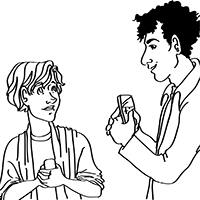
- — Здра́вствуй, Джош.
- — Приве́т, Ке́йтлин.
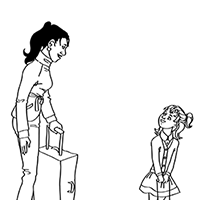
- — Здра́вствуй. Как тебя́ зову́т?

- — Ба́бушка, приве́т!
Ты и вы: Informal vs. Formal Forms of Address
- One-to-One Informal
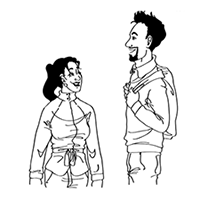
- — Ама́нда, ты студе́нтка?
— Нет, я аспира́нтка.
- One-to-One Formal

- — Ама́нда, вы студе́нтка?
Like other languages you may have studied (including French, Spanish and German) Russian has both informal and formal forms of address. We see the distinction first and foremost in the existence of two Russian words that translate as «you»: ты and вы. In the example above, Natalya Mikhailovna addresses Amanda formally using вы; Tony uses the informal form ты.
The choice of which of these forms you need will depend on the context and relationship of the people involved, and it may take you some time to get used to making the distinction.
When talking to one person, when do Russians use ты, and when do they use вы?
- Generally say вы...
- to a person in authority
- to a stranger (adult)
- to a person you don't know well
- Generally say ты...
- to a family member
- to a close friend or peer (like another student)
- to a child
Review these one-to-one interactions and note who is being addressed with ты (or saying Здра́вствуй) and вы (or saying Здра́вствуйте) in each of them.
- One-to-One Informal

- — Ты студе́нт?
— Да. А ты
— Нет, я аспира́нтка.
- One-to-One Informal

- — Здра́вствуй, Джош.
— Приве́т, Ке́йтлин.
- One-to-One Formal
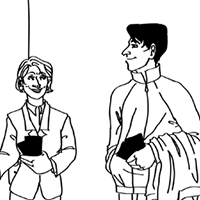
- — Здра́вствуйте, Дени́с. Как хорошо́, что вы уже́ здесь!
— Здра́вствуйте, Ната́лья Миха́йловна!
What about if you are addressing more than one person?
This, in other words, is the equivalent of «you all» -- which those of you who hail from the southern part of the US may be used to hearing as «y'all».
If you are addressing more than one person, always use вы.
When addressing one person, the choice of the formal вы or informal ты can be filled with nuance. When speaking to an adult, start off with the formal вы, since you will not offend anyone by being overly polite. If such formality seems unnecessary, the native speaker may suggest switching to ты. The phrases на вы / на ты (on a вы footing / on a ты footing) are how Russians describe whether they are on a formal or informal basis with one another.
Как дела́? Finding out how someone is.
Josh is remembering back to when he was just starting out in Russian class…
- One-to-One Informal
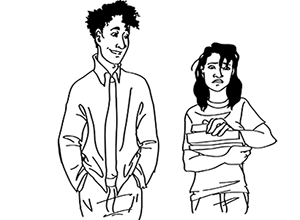
- — Приве́т, Джош.
— Приве́т, Ло́ра.
— Как у тебя́ дела́?
— Норма́льно, спаси́бо. А как у тебя́ дела́??
— А у меня́ всё пло́хо.
— Да?
— Да.
- One-to-One Formal
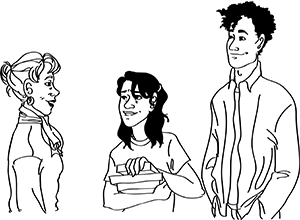
- — Здра́вствуйте, Ло́ра.
— Здра́вствуйте.
— Как у вас дела́?
— Спаси́бо, ничего́.
Remember that «Как (у вас / у тебя́) дела́?» is not a greeting. Russians do not use “how are you?” or “how are you doing?” in place of “hello.”
Personal pronouns
By now you have seen a number of personal pronouns in Russian:
| Singular | |
|---|---|
| я | I |
| ты | you |
|
он она́ онó |
he she it |
| Plural | |
|---|---|
| мы | we |
| вы | you plural (also you formal singular) |
| они́ | they |
You may have noticed that you have seen other forms of these pronouns as well, which are used in the phrase for asking about a person’s name. For now you should just learn them as part of the phrases "Как вас зову́т? / Как тебя́ зову́т?" "Меня́ зову́т …"
You will work more with the third person pronouns он, она́, оно́ , они́ later in this section when you learn more about the gender of nouns in Russian.
Интона́ция: Intonation in Yes/No Questions
Intonation refers to the rise and fall of a speaker’s voice over the course of a spoken phrase. In English, we use intonation together with word order to distinguish statements from yes-no questions. In Russian, speakers convey the difference between statements and yes-no questions primarily through intonation and a question mark in writing. Compare the English and Russian versions of the question and statement below:
Is Caitlin a student?
Caitlin is a student.
The English question and statement have different word order, since we invert the verb and subject to make a yes-no question. Even if the punctuation were missing, it would be clear from the word order that the first utterance is almost certainly a question, and the second is most likely a statement.
Ке́йтлин студе́нтка
Without punctuation, and lacking any context, we cannot tell whether this is a statement or a question until we hear the intonation. (Remember that Russian does not express the verb “to be” in the present tense).
Listen to the two versions below to see if you can hear a difference:
Statements in Russian are marked by mid-range intonation through the utterance with a falling intonation at its conclusion. Yes-no questions are marked by mid-range intonation, but there is a sharp rise in intonation on the stressed syllable of the key word, followed by lower intonation to the end of the utterance.
Listen carefully and compare the intonation used in the sentences below.
| Вы студе́нт? | Вы студе́нт. |
| Ваш бага́ж здесь? | Ваш бага́ж здесь. |
| Кафе́ там? | Кафе́ там. |
Упражне́ние 3.
Listen to the following sentences, and then indicate whether each is a statement or a question.
Intonation is a powerful tool for expressing nuances of meaning. Note that even a two-word question can be pronounced in two ways. Shifting the rising intonation from one word to another changes the focus of the question, and therefore the likely answers.
Using the wrong intonation for a question or an answer is likely to confuse your listeners and cause miscommunication. You will have other opportunities to notice differences in intonation and work on understanding and producing intonation correctly in future units.
